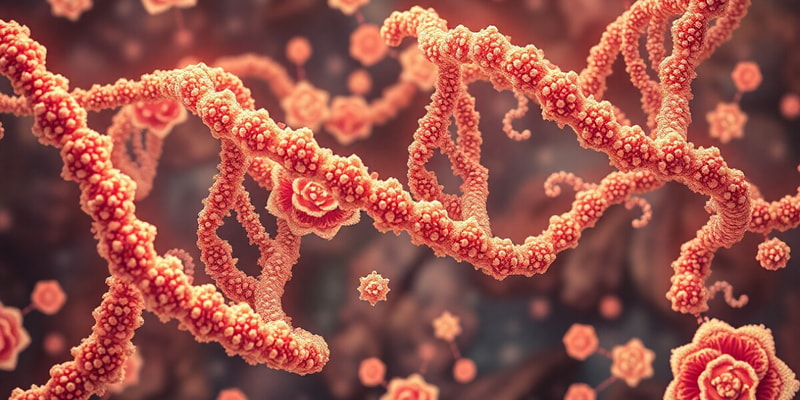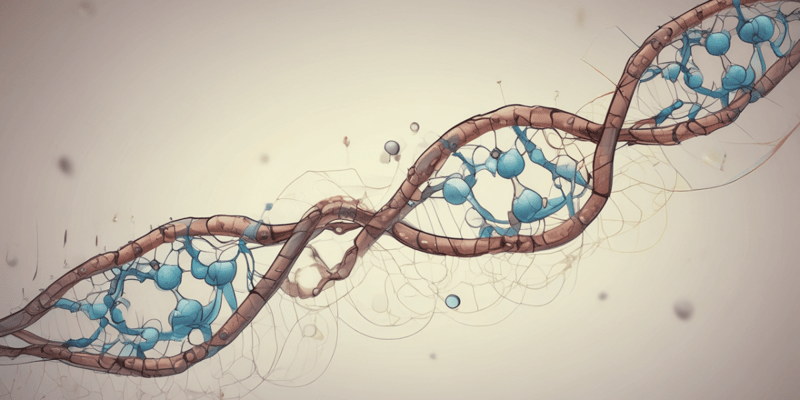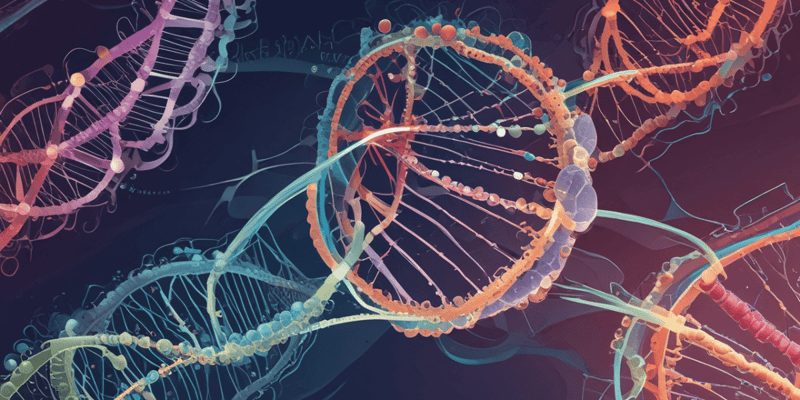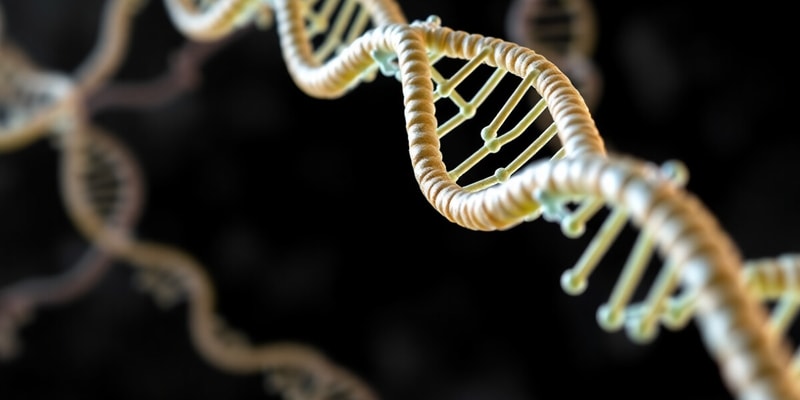Podcast
Questions and Answers
What is the role of the promoter in RNA synthesis?
What is the role of the promoter in RNA synthesis?
Which statement accurately describes the template strand during transcription?
Which statement accurately describes the template strand during transcription?
Which of the following is NOT a component of the prokaryotic RNA polymerase?
Which of the following is NOT a component of the prokaryotic RNA polymerase?
What signifies the start point of transcription?
What signifies the start point of transcription?
Signup and view all the answers
How does RNA synthesis differ from DNA synthesis regarding primer requirement?
How does RNA synthesis differ from DNA synthesis regarding primer requirement?
Signup and view all the answers
What is the significance of the terminator in RNA transcription?
What is the significance of the terminator in RNA transcription?
Signup and view all the answers
Which direction does RNA polymerase synthesize RNA during transcription?
Which direction does RNA polymerase synthesize RNA during transcription?
Signup and view all the answers
What differentiates the sequence of RNA from that of the template strand?
What differentiates the sequence of RNA from that of the template strand?
Signup and view all the answers
What role does the sigma factor play in prokaryotic transcription?
What role does the sigma factor play in prokaryotic transcription?
Signup and view all the answers
What is the composition of a holoenzyme in prokaryotic transcription?
What is the composition of a holoenzyme in prokaryotic transcription?
Signup and view all the answers
Which of the following best describes the role of TFIID in eukaryotic transcription?
Which of the following best describes the role of TFIID in eukaryotic transcription?
Signup and view all the answers
What triggers the termination of transcription in eukaryotic cells?
What triggers the termination of transcription in eukaryotic cells?
Signup and view all the answers
How does actinomycin D affect transcription?
How does actinomycin D affect transcription?
Signup and view all the answers
Which factor has kinase activity that is critical during the initiation phase of eukaryotic transcription?
Which factor has kinase activity that is critical during the initiation phase of eukaryotic transcription?
Signup and view all the answers
What is a common feature of prokaryotic and eukaryotic promoters?
What is a common feature of prokaryotic and eukaryotic promoters?
Signup and view all the answers
What occurs during the elongation phase of transcription in eukaryotes?
What occurs during the elongation phase of transcription in eukaryotes?
Signup and view all the answers
What is added to the 5′ end of mRNA during post-transcriptional modification?
What is added to the 5′ end of mRNA during post-transcriptional modification?
Signup and view all the answers
What role does poly(A) polymerase play in mRNA processing?
What role does poly(A) polymerase play in mRNA processing?
Signup and view all the answers
Which of the following statements about splicing is correct?
Which of the following statements about splicing is correct?
Signup and view all the answers
What is the purpose of alternative splicing?
What is the purpose of alternative splicing?
Signup and view all the answers
Which disease is characterized by autoantibodies against small nuclear ribonucleoproteins (snRNPs)?
Which disease is characterized by autoantibodies against small nuclear ribonucleoproteins (snRNPs)?
Signup and view all the answers
How does RNA editing alter mRNA coding information?
How does RNA editing alter mRNA coding information?
Signup and view all the answers
What outcome results from a nucleotide change at the intron-exon junction in β-thalassemia?
What outcome results from a nucleotide change at the intron-exon junction in β-thalassemia?
Signup and view all the answers
In which tissue is the apoB-48 protein synthesized due to RNA editing?
In which tissue is the apoB-48 protein synthesized due to RNA editing?
Signup and view all the answers
Study Notes
RNA Synthesis (Transcription)
- RNA synthesis, also known as transcription, is the transfer of information from DNA to RNA.
Terminology
- Upstream: 3' direction of the template strand.
- Downstream: 5' direction of the template strand.
- Transcription region: Nucleotide sequence on the template strand that RNA polymerase transcribes.
- Promoter: Nucleotide sequence upstream of the transcription unit, where RNA polymerase attaches to DNA.
- Terminator: Nucleotide sequence downstream of the transcription unit, marking the end of transcription.
- Start point (+1): The nucleotide at the 3' end of the transcription region.
- Positive numbers: Increase as you move downstream.
- Negative numbers: Assign numbers to bases in the promoter that occur before the start site.
- Transcription unit: Encompasses the promoter, transcription region, and terminator.
- Element/Box: Any defined nucleotide sequence repeated in DNA.
Principles of Transcription
- Only one strand of DNA is transcribed, called the template strand. The other strand is the coding strand.
- The RNA sequence is complementary to the template strand and identical to the coding strand, except uracil (U) replaces thymine (T).
- RNA synthesis occurs in three main phases:
- Template binding and formation of preinitiation complex (PIC)
- Initiation
- Elongation
- Termination
Transcription in Prokaryotes
- Prokaryotes have a single DNA-dependent RNA polymerase.
- This enzyme catalyzes the synthesis of all RNA types, polymerizing ribonucleoside triphosphates, directed by the DNA template in the 5' → 3' direction.
- It differs from DNA polymerase as it doesn't require a primer to start and lacks proofreading abilities.
- The RNA polymerase complex consists of a core enzyme and a sigma factor (σ):
- Core enzyme: Composed of five subunits (2 α, 1 β, 1 β', 1 ω).
- Sigma factor (σ) : Enables the core enzyme to recognize specific promoter regions in DNA . Different sigma factors recognize different promoters.
Termination of Transcription (Prokaryotes)
- Rho (ρ) dependent termination: Requires a protein factor called Rho (ρ) that recognizes a specific termination sequence and has RNA-DNA helicase activity.
- Rho independent termination: Doesn't require a protein factor. Specific DNA sequences and secondary structures form, causing the RNA polymerase to detach.
Clinical Applications (Prokaryotes)
- Rifampicin: Inhibits prokaryotic RNA polymerase.
- Actinomycin D: Binds to DNA and prevents transcription.
Transcription in Eukaryotes
- Eukaryotes have three types of RNA polymerase:
- RNA polymerase I: Synthesizes rRNA.
- RNA polymerase II: Synthesizes mRNA, most snRNAs, and miRNAs.
- RNA polymerase III: Synthesizes tRNA.
- Eukaryotic promoters contain basal (basal expression) elements:
- TATA box: A DNA sequence that defines the start site, typically located 25-30 base pairs upstream from the start site.
- CAAT box and GC box: Located upstream, involved in controlling the frequency of transcription. Proteins binding these boxes influence the initiation efficiency.
- General transcription factors (GTFs) are required for accurate initiation.
Post-transcriptional Modifications
- Pre-mRNA undergoes modifications (in eukaryotes):
- 5' capping: Adding a methyl-guanosine cap to the 5' end for mRNA protection and ribosome binding.
- Splicing: Removing non-coding introns and joining exons to create a functional mRNA molecule.
- Polyadenylation: Adding a poly(A) tail to the 3' end of mRNA for stability and translation efficiency.
- mRNA editing: Changes in the mRNA sequence after transcription can alter the amino acid sequence of the protein encoded by the gene.
Studying That Suits You
Use AI to generate personalized quizzes and flashcards to suit your learning preferences.
Related Documents
Description
Test your knowledge on the process of RNA synthesis, also known as transcription. This quiz covers key terminologies and concepts including promoters, terminators, and the transcription unit. Perfect for students studying genetics or molecular biology.




